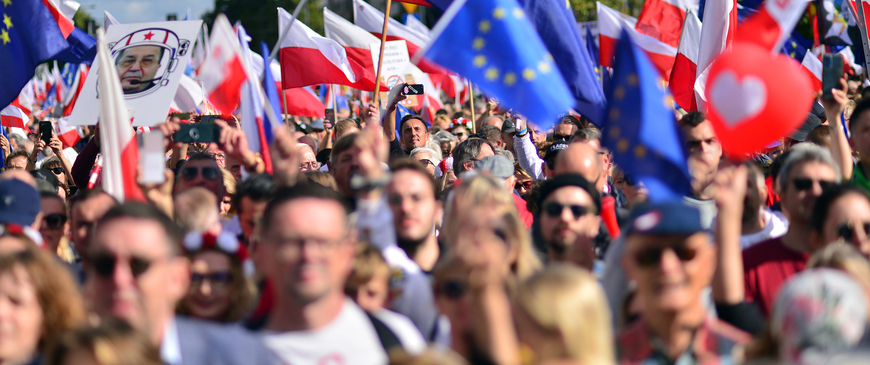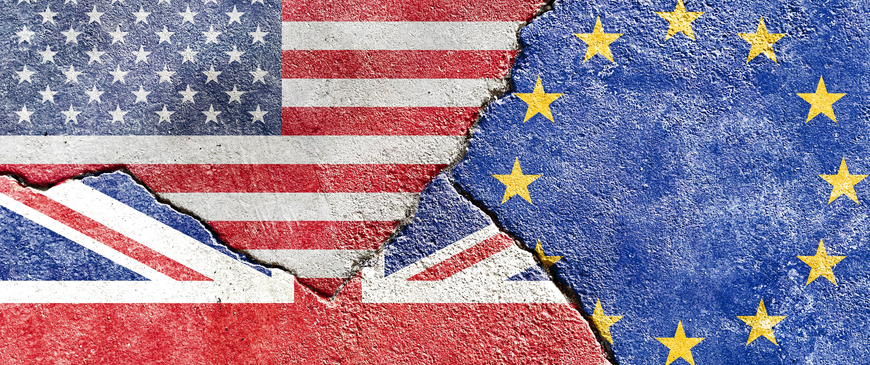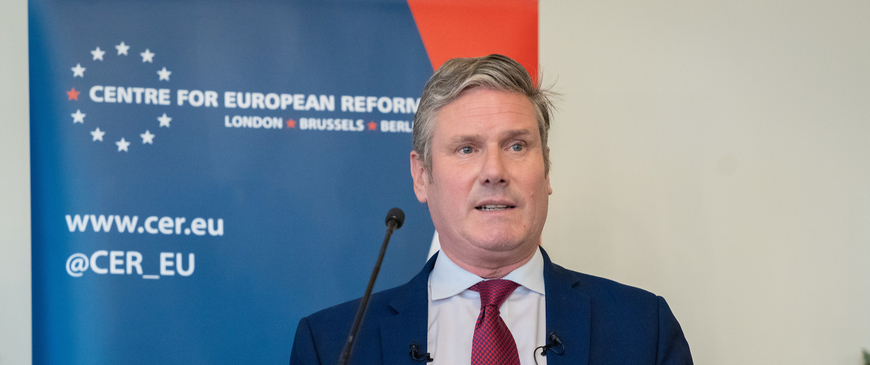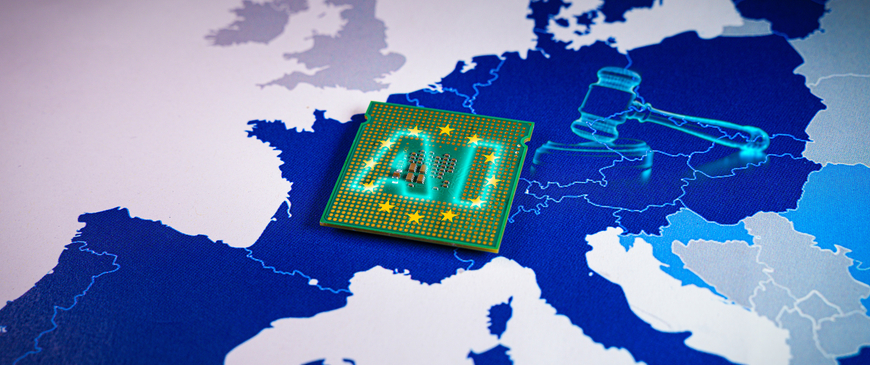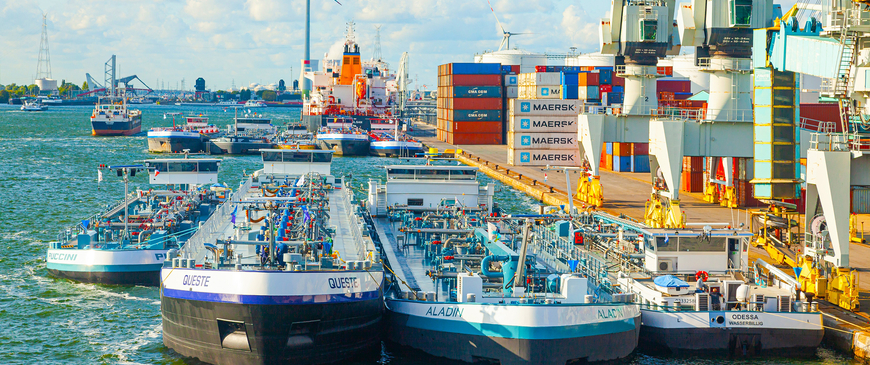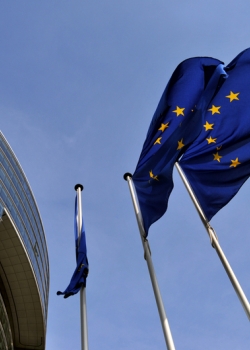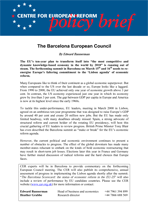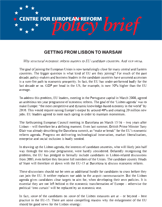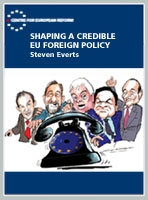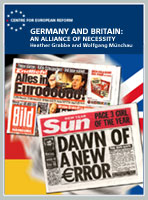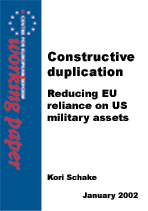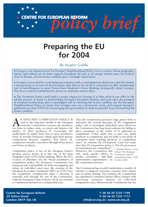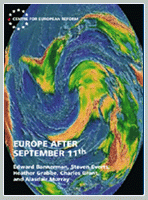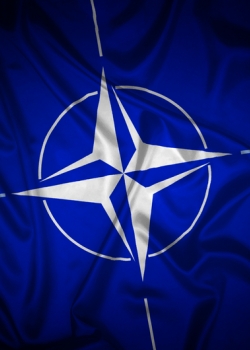Research
Restoring leadership to the European council
01 April 2002
Everybody knows the European Commission is in bad need of reform. The problems in the European Council - the regular summits of heads of government - and the Council of Ministers are less widely known but just as serious, and they contribute to Europe's lack of leadership.
The EU needs a flexible pact
01 April 2002
The decision of EU finance ministers in February 2002 to ignore a Commission proposal to warn Germany and Portugal over the level of their budget deficits has jeopardised the credibility of the Stability and Growth Pact.
Issue 23 - 2002
29 March 2002
- Restoring leadership to the European council , Charles Grant
- The EU needs a flexible pact , Alasdair Murray
The Barcelona European Council
01 March 2002
The EU's ten-year plan to transform itself into "the most competitive and dynamic knowledge-based economy in the world by 2010" is running out of steam. The forthcoming summit in Barcelona on March 15 and 16 needs to reenergise Europe's faltering commitment to the 'Lisbon agenda' of economic reform.
Getting from Lisbon to Warsaw
18 February 2002
The goal of joining the European Union is now tantalizingly close for many central and Eastern countries. The bigger question is what kind of EU are they joining? For much of the past decade, policy-makers and business leaders in the candidate countries have assumed accession is a sure-fire path to economic prosperity.
Shaping a credible EU foreign policy
05 February 2002
It is clear that Europe needs to pool its resources if it wants to play a greater role in the world. But progress towards a coherent and effective EU foreign policy has been slow. Steven Everts examines the reasons why – and offers an agenda for reform.
Germany and Britain: An alliance of necessity
04 February 2002
Europe needs Germany and the UK to form an alliance. These two countries are closer than they have been for a generation on many vital issues.
Breaking the EU's competition monopoly
01 February 2002
As the EU's competition chief, Mario Monti can make or break the world's biggest companies. The exercise of his wide-ranging powers is always controversial. Last summer, he blocked the planned 50 billion euro GE-Honeywell merger.
The long road to Doha
01 February 2002
The launch of a new round of multilateral trade negotiations by the World Trade Organisation (WTO) at Doha was not only a major accomplishment, it was a case of snatching victory from the jaws of defeat. As recently as six months ago, few would have predicted that the world's trading...
Europe must get on-message
01 February 2002
The EU spends 100 million euro each year on its communications budget, yet is demonstrably failing to 'connect' with Europe's 380 million citizens. Recent polls show that less than half of the EU's voters feel that membership of the 15-state club is a 'good thing',while turnout in European Parliament elections...
The future of EU competition policy
01 February 2002
This report calls for a radical rethink of how competition policy is run. The author argues for a new 'European Competition Agency' to take the politics out of merger and anti-trust investigations.
Issue 22 - 2002
25 January 2002
- Breaking the EU's competition monopoly, Edward Bannerman
- The long road to Doha , Richard Cunningham and Peter Lichtenbaum
- Europe must get on-message , Gareth Harding
Constructive duplication: Reducing EU reliance on US military assets
04 January 2002
In 'Constructive duplication', Kori Schake asserts that the Bush administration has taken a positive approach to the European Union's attempts to develop a military capability.
Preparing the EU for 2004
07 December 2001
The debate about the future of Europe is supposed to consider how the Union will function after enlargement. In practice, the agenda set at Laeken addresses longstanding institutional problems, but does not pay sufficient attention to the qualitative changes that enlargement will bring.
Europe after September 11th
07 December 2001
This report argues that many good things have come out of the crisis, so far. The US is re-engaging with the world. The European Union has accelerated its plans to integrate in the fields of external and internal security.
NATO's big bang
03 December 2001
In 2002 NATO has a rare opportunity to enhance stability in Eastern Europe and build a new relationship with Russia. At the Prague summit in November, the alliance should offer membership to seven countries - Bulgaria, Estonia, Latvia, Lithuania, Romania, Slovakia and Slovenia.
Such a 'Big Bang' would consolidate pro-western democratic...
Such a 'Big Bang' would consolidate pro-western democratic...
Time to abolish the EU's rotating presidency
03 December 2001
The EU performance in foreign policy in the aftermath of September 11th has been underwhelming. European leaders have maintained unity on the substance of policy - a major step forward compared with the situation a decade ago.
The euro comes of age
03 December 2001
A dozen years after the Delors Committee produced a plan for Economic and Monetary Union, the euro finally becomes a reality for 300 million Europeans this January.
A focused campaign not a crusade
01 October 2001
As America comes to terms with the massive terrorist attacks on September 11, and as it frames and implements its response, the key question for Europe is: what should its role be?
US, EU and Russia: A new order?
01 October 2001
In the aftermath of September 11th's horrific events, the world has focused on America's diplomatic and military response. Some of the security issues that commentators were worrying about before the terrorist attacks - such as missile defence, the Balkans and the future of NATO - have left the headlines.

